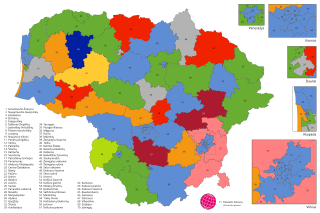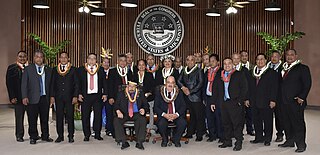
The Constitution of the Republic of Lithuania defines the legal foundation for all laws passed in the Republic of Lithuania. The first constitution of the contemporary republic was enacted on 1 August 1922. The current constitution was adopted in a referendum on 25 October 1992.

Elections in Lithuania are held to select members of the parliament, the president, members of the municipal councils and mayors, as well as delegates to the European Parliament. Lithuanian citizens can also vote in mandatory or consultative referendums.
Lithuania does not recognise same-sex marriages or civil unions. A bill to grant same-sex couples some limited legal rights and benefits is pending in the Seimas.

There have been twelve referendums in Lithuania since it declared independence from the Soviet Union on 11 March 1990. Because of strict requirements, only four referendums have been successful. Older Lithuanian laws required that more than half of all registered voters would vote in support of a proposal for it to become a binding obligation to the government. In 2002, this requirement was lowered to one third of all registered voters.

Lithuanian nationality law operates on the jus sanguinus principle, whereby persons who have a claim to Lithuanian ancestry, either through parents, grandparents, great-grandparents may claim Lithuanian nationality. Citizenship may also be granted by naturalization. Naturalization requires a residency period, an examination in the Lithuanian language, examination results demonstrating familiarity with the Lithuanian Constitution, a demonstrated means of support, and an oath of loyalty. A right of return clause was included in the 1991 constitution for persons who left Lithuania after the Soviet occupation in 1940 and their descendants. Lithuanian citizens are also citizens of the European Union and thus enjoy rights of free movement and have the right to vote in elections for the European Parliament.
Referendums in Taiwan at both the national and local level are governed by the Referendum Act of Taiwan, which was enacted by the Legislative Yuan in December 2003. Citizens can propose laws via referendums at the national and local levels. The Referendum Act also allowed people to make changes or abolish laws by referendums.

A nationwide referendum was held in Moldova on 5 September 2010 on whether or not the country should amend the Constitution of Moldova to return to direct popular election of the president. Since 2001, the president had been indirectly elected by Parliament, with a supermajority of 61 seats required for election. The voters are asked to answer the following question: "Would you agree with the Constitutional amendment, which would allow the election of the President of the Republic of Moldova by the entire population?" Voters chose one of the proposed options: "Yes (for)" or "No (against)". Of those who had cast their vote, 87.83% chose "Yes". However, the referendum did not pass because only 30.29% of voters turned out, short of the necessary 33% for the referendum to be considered valid.

A referendum on the presidency was held in Lithuania on 23 May 1992. Voters were asked whether they approved of restoring the institution of the presidency. It was initiated by Sąjūdis.

A constitutional referendum was held in Lithuania on 10 November 1996 alongside the second round of the parliamentary elections. Voters were asked whether they approved of an amendment to Article 47 of the constitution to add a paragraph allowing EU citizens to buy agricultural land. Although it was approved by 52% of those voting, voter turnout was only 39.7% and the referendum failed to pass the threshold of 50% of registered voters in favour.

A four-part referendum was held in Lithuania on 20 October 1996 alongside the first round of parliamentary elections. Voters were asked whether they approved of three amendments to the constitution and whether money from the sale of state property should be used to compensate those who lost their Soviet-era savings due to inflation. The three constitutional amendments would reduce the number of members of the Seimas, fix the date for elections to be in the spring, and to reserve at least 50% of government expenditure to social spending.

Parliamentary elections were held in the Federated States of Micronesia on 7 March 2017, alongside a referendum on allowing dual citizenship. Although the proposed constitutional amendment to allow dual citizenship was approved by a majority of voters, it did not pass the threshold of 75% voting in favour in at least three of the four states.

A constitutional referendum was held in Lithuania on 12 May 2019, alongside the first round of the presidential elections. Two proposals were put to voters – one to reduce the number of MPs in the Seimas from 141 to 121 and one to allow Lithuanians to hold dual citizenship with a list of countries meeting "European or transatlantic integration criteria," which would be determined by law. In order for the first constitutional amendment to be passed, voter turnout was required to be above 50%, and at least 33.3% of registered voters would have to vote in favour of the proposal. For the second amendment, at least 50% of registered voters would have to vote in favour of the proposal.

Parliamentary elections were held in Lithuania on 11 and 25 October 2020 to elect the 141 members of the Seimas. 71 were elected in single-member constituencies using the two-round system, and the remaining 70 in a single nationwide constituency using proportional representation. The first round was held on 11 October and the second round on 25 October.

A constitutional referendum was held in Liberia on 8 December 2020 alongside Senate elections and two by-elections to the House of Representatives. It had been planned for 13 October, but was postponed due to the COVID-19 pandemic. Voters were asked whether they approved of eight amendments to the constitution, voting separately on each one. Although a majority of valid votes were in favour for each proposal, the two-thirds quorum was not met for any proposal.
A constitutional referendum was held in Taiwan on 26 November 2022. Voters voted on adding Article 1-1 to the Additional Articles of the Constitution of the Republic of China. Had it passed, the voting age would have been lowered from 20 to 18 years. The amendment would also have lowered the minimum age of candidacy from 23 to 18 years once the relevant electoral laws had been amended accordingly.

A referendum on nine proposed amendments to the constitution was held in Micronesia on 4 July 2023. Eight of the amendments were proposed by the Constitutional Convention elected in 2019, and one amendment was proposed by Congress. All nine amendments passed, and were officially ratified by President Simina on 4 October 2023.

Presidential elections were held in Lithuania using the two-round system on 12 May 2024, alongside a referendum on allowing multiple citizenships. Incumbent President Gitanas Nausėda is running for re-election to a second term. A second round will be held on 26 May, as no candidate received an absolute majority of the vote. The elections saw Nausėda and Prime Minister Ingrida Šimonytė facing off in the runoff in a rematch of the 2019 election in which Nausėda defeated Šimonytė.
Events in the year 2024 in Lithuania.
Giedrimas Jeglinskas is a Lithuanian politician and former NATO official who is the candidate of the Union of Democrats "For Lithuania" in the 2024 Lithuanian presidential election. Previously, he served as Assistant Secretary General of NATO from 2019 to 2022 and Vice-Minister of National Defence from 2017 to 2019.

Dainius Žalimas is a Lithuanian lawyer, jurist and politician who served as the chairman of the Constitutional Court of Lithuania from 2014 to 2021. He is the candidate of the Freedom Party in the 2024 Lithuanian presidential election.









